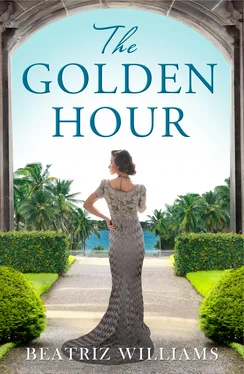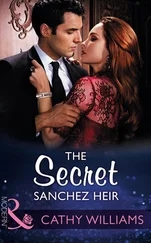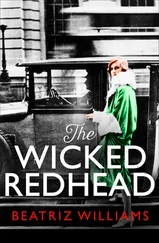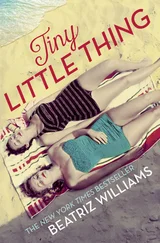1 ...8 9 10 12 13 14 ...23 “Give up?” said Jack. “Now what kind of talk is that?”
“The smart kind, brother. The realist kind.”
He glanced at last to the newcomer. “Excuse me one minute, Mrs. Randolph.”
The drink was finished. I stubbed out the cigarette. Jack had taken the newcomer’s order and turned to the row of bottles behind him. I stood up, a little more unsteady than I ought to have been after a single martini, and fished a shilling from my pocketbook.
“I beg your pardon,” said the gentleman to my right. “I couldn’t help overhearing.”
“Of course you couldn’t.”
“You are not leaving, surely?”
“I’m afraid I am.”
“But you haven’t eaten yet.”
“Maybe I’m having dinner elsewhere.”
“Now, Mrs. Randolph,” the man said slowly, “we both know that isn’t true.”
Up until this point, I’d been speaking into air. I wasn’t in the habit of addressing bold men, it was a stubbornness of mine. But you can’t ignore a fellow who calls you by name, can you? I turned my head. As I said, I had taken notice of him before. He was one of the regulars at the Prince George, and besides, you couldn’t help but notice him. He was tall and lustrous and strapping, dressed in a pressed suit and white shirt and green necktie, and even though his nose was large and his jaw a little soft, you had to admit he was handsome, especially when he looked at you dead on from that pair of wicked, intelligent eyes. Also, he had an elastic way of moving, like an athlete.
“I beg your pardon,” I said. “I don’t believe we’ve been introduced.”
He held out a large hand. “Alfred de Marigny.”
“I’ve heard that name before, I believe.”
“I’m afraid I have something of a reputation.” There was a note of apology in his voice.
“I’ll say. If you believe all the stories.”
“ Do you believe the stories?”
“Naturally. I’ll bet they’re a hundred times more interesting than the truth. Thanks for the drink, by the by.”
He lifted his eyebrows and signaled to Jack. “You’re welcome.”
“I didn’t say I wanted another.”
“Didn’t you? But please, Mrs. Randolph, sit down. We cannot have you standing like that. We cannot have you leaving like this.”
“Why not?” I asked. But I sat down.
He sat too, facing me, elbow propped on the bar. “What is this you are saying, about giving up? Give up on what?”
I reached into my pocketbook for the cigarette case. You know, something for my hands to do, something to occupy my attention while the most notorious playboy in Nassau settled himself on a nearby stool and fixed his attention on me. I tried to assemble a few facts in my memory. He was recently divorced from some wealthy Manhattanite who had left her previous husband for him. He was a yachtsman, a good one. A foreigner with a title of some kind, which nobody knew how he acquired, or whether it really belonged to him. In short, he was a—what was the word I had overheard? A mountebank. Fine ten-dollar word, mountebank . I plucked a cigarette and said, “Did I say that?”
“You did. I’m certain of it. Allow me.” He removed a matchbook from his pocket and lit me up in a series of deft movements: selecting the match, striking flame, holding it just to the end of the cigarette, so that the blue core touched the paper in a tiny explosion.
“Thank you.” I opened the case again and offered him the contents. He chose one and thanked me in turn. As we completed these little rituals, Jack returned with a pair of drinks: another martini for me, a whiskey for de Marigny.
When we had both tasted the waters, he said, “I hope I have not offended. I only wish to know if I might be of some assistance.”
“Out of the kindness of your heart?”
He pressed his hand against his chest. “I am a gentleman, Mrs. Randolph. I ask nothing in return.”
“Sure you don’t. Not that I hold it against you, mind you. It’s what makes the world go round.”
“What makes the world go round?”
“Favors.” I reached for the ashtray. “To answer your question, I’m a journalist. I’ve been sent here by an American magazine to give our readers an inside view of Nassau society in these interesting times.”
“By Nassau society, do you perhaps mean the duke and his wife?”
“Well. That is what’s interesting about it, after all.”
“I see.” He turned his face a few inches to the left, as if to regard the tables and chairs, which had begun to populate, mostly men in pale, pressed linen suits, like de Marigny, only shorter and pudgier, your commonplace middle-aged merchant, Bahamicus mercantilis vulgarii. A couple of conspicuous American tourists. “I’m afraid there isn’t much I can do for you in this regard, Mrs. Randolph. I am not a favorite of His Royal Highness.”
“Goodness me. Why ever not? I thought it was part of His Highness’s duty to make himself agreeable to his allies.”
“Allies?”
“I couldn’t help noticing your accent, Monsieur de Marigny.”
“Mrs. Randolph, I am a British subject by birth. I was born in Mauritius, which is a British colony, somewhat to the right of Africa.”
“I see,” I said. “How awfully exotic. Then it’s Mister de Marigny?”
He made a small smile. “My friends call me Freddie.”
“Well then, Freddie. How did a nice chap like you end up on the wrong side of the Duke of Windsor?”
“Do you ask me as a journalist, Mrs. Randolph, or as a friend?”
“Both. I’m a desperate woman, you know. Any little old tidbit might save my career.”
“Then I don’t mind telling you that the duke is a terrible bigot, a vain, weak, effeminate man, entirely ruled by his wife and his own greed.”
He still wore the smile, but his voice was serious, and not at all hushed as you might expect, saying a thing like that in a place like this. I tapped my cigarette on the edge of the ashtray, taking care to keep my fingers steady despite the buzz along my nerves. “Golly. Say what you really think, Freddie.”
“I beg your pardon. Mine is an outspoken nature.”
“Oh, I don’t mind a bit, believe me. Is he a traitor?”
“No,” de Marigny said, “but he is the fool of the Nazis. I knew him a little before the war, you know, when I lived in London. It’s no secret he admired Hitler very much in those days. His wife, I think, is of the same mind. You will remember, I think, their visit to Germany, shortly after they married?”
“I remember, all right. That was some show. Parades and factory tours and what have you. Wearing their best clothes and their best smiles.”
“He is an idiot.” De Marigny sucked on his cigarette. His gaze, which had been trained amicably on me, lost a little focus, lost a little amity, and slipped to some point past my left ear. “I had a friend in those days, a good chap, handsome fellow, clever, a Jew. He traveled back to Berlin to persuade his family to leave. This was in 1936, I believe, after they passed these terrible laws. That was the last I ever saw of him.”
“Do you believe what some of the newspapers are saying? About the camps and so on? Or is it all just propaganda, like spearing the Belgian babies?”
He tossed down a considerable measure of whiskey and stared at the cubes of ice left behind. The air was warm, the way the air is always warm in Nassau, and you could almost hear the melting of the ice under the draft of the ceiling fan. His hand, holding the glass, was quite long, and the fingers looked as if they could crush rocks. I waited for him to speak. Most people will, if you give them enough time. Nobody likes a silence.
“I have a story for you,” he said at last. “I think it illustrates rather nicely the character of the man.”
Читать дальше












